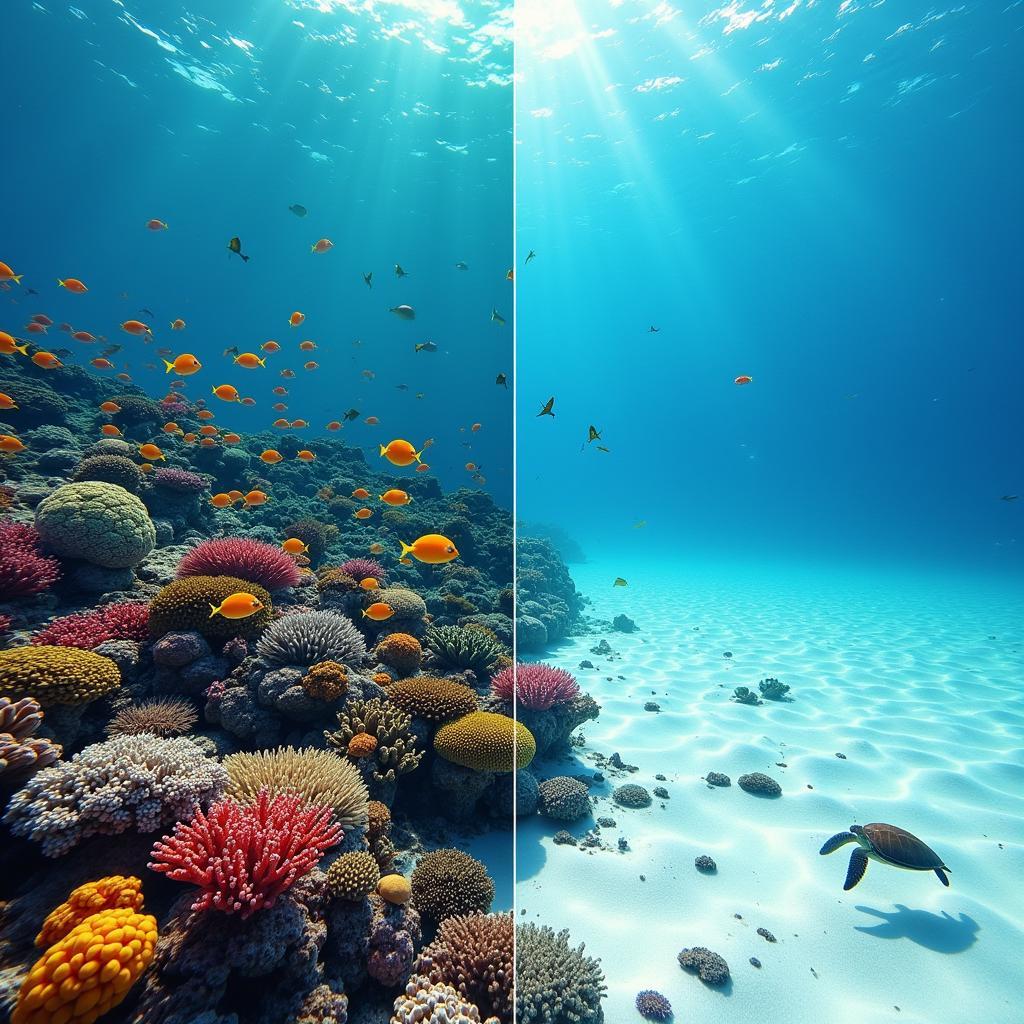Taking the IELTS Reading test can be a daunting task, especially when the topics involve complex scientific phenomena such as climate change and its impacts on coral reef ecosystems. This article will provide you with an in-depth understanding of how climate change affects coral reefs, while offering a comprehensive IELTS Reading practice text and relevant questions to help you prepare effectively.
IELTS Reading sections often include topics of pressing global issues, and given the rising awareness of climate change, it’s highly probable that such themes could appear in your exam. By focusing on this prevalent topic, you can anticipate and prepare for questions on similar subject matter in the future.
Practice IELTS Reading Passage
Coral Reef Ecosystems and Climate Change: Analyzing the Impact
Coral reefs are one of the most diverse and valuable ecosystems on Earth, providing a habitat for thousands of marine species. These underwater structures, primarily made up of calcium carbonate secreted by corals, are not only crucial for marine biodiversity but also play a significant role in coastal protection and the economy of many coastal populations.
However, climate change poses a significant threat to coral reef ecosystems. Rising sea temperatures lead to a phenomenon known as coral bleaching. Under stress conditions such as increased water temperatures, corals expel the symbiotic algae known as zooxanthellae, which live within their tissues and provide them with food through photosynthesis. The loss of these algae turns the corals white, a condition referred to as bleaching. Although corals can survive a bleaching event, prolonged conditions can lead to their death.

Ocean acidification is another major consequence of climate change. As atmospheric CO2 levels rise, more carbon dioxide gets absorbed by the ocean, forming carbonic acid. This process decreases the water’s pH, leading to more acidic conditions. Acidic waters reduce the availability of aragonite, a form of calcium carbonate, which is essential for corals to build their skeletons. Consequently, coral growth rates decline, and the structural integrity of reefs is compromised.
Moreover, climate change intensifies the frequency and severity of extreme weather events such as tropical cyclones and hurricanes. These storms can cause physical damage to coral reefs by breaking coral branches, shifting sediment, and reducing light availability due to increased turbidity. The cumulative effect of these stressors diminishes the resilience of coral reef ecosystems, making it challenging for them to recover.
Efforts to mitigate the impact of climate change on coral reefs include global initiatives aimed at reducing greenhouse gas emissions, promoting sustainable fishing practices, and establishing marine protected areas. Restoration projects such as coral gardening and artificial reefs also offer hope. By transplanting healthy, resilient coral fragments to degraded areas, scientists strive to replenish and restore the ecological balance of these critical habitats.
Coral reefs are indispensable, yet increasingly fragile ecosystems, facing unprecedented risks due to climate change. The interplay of rising temperatures, ocean acidification, and storm intensity demand immediate and sustained efforts to preserve and protect these natural treasures.
Reading Comprehension Questions
Multiple Choice
- What are coral reefs primarily made up of?
a) Marine algae
b) Calcium carbonate
c) Zooxanthellae
d) Sediment - What phenomenon occurs when corals expel zooxanthellae?
a) Coral degradation
b) Coral bleaching
c) Coral growth
d) Coral acidification
Identifying Information (True/False/Not Given)
- Coral reefs only provide habitat for fish.
- Rising seawater temperatures can lead to coral bleaching.
- Coral reefs are not affected by ocean acidification.
Matching Information
Match the following points with their respective explanation as given in the text:
- Coral bleaching
- Ocean acidification
- Extreme weather events
A. Acidic conditions reduce the availability of essential minerals.
B. Physical damage from storms.
C. Loss of symbiotic algae due to stress.Sentence Completion
Complete the following sentences using no more than three words from the passage.
- Coral reefs are critical for _____ and the economy of coastal populations.
- Efforts to restore coral reefs include _____ and artificial reefs.
Answer Key with Explanations
- b) Calcium carbonate – Coral reefs are primarily made up of calcium carbonate secreted by corals.
- b) Coral bleaching – When corals expel zooxanthellae, it results in coral bleaching.
- False – Coral reefs provide habitat for thousands of marine species, not just fish.
- True – Rising seawater temperatures can indeed lead to coral bleaching.
- False – Coral reefs are significantly affected by ocean acidification.
- Marine biodiversity – Coral reefs are critical for marine biodiversity and the economy of coastal populations.
- Coral gardening – Efforts to restore coral reefs include coral gardening and artificial reefs.
Lessons Learned
Common Mistakes
- Misinterpreting Keywords: Words like “only” and “not” can change the meaning completely. Pay attention to such modifiers.
- Assuming Information: Never assume facts not explicitly stated. Stick to the passage.
- Overlooking Details: Scrutinize the passage for specific details that could be crucial to answering questions correctly.
Vocabulary
- Calcium carbonate (noun): A chemical compound (CaCO3) forming the structure of coral reefs.
- Zooxanthellae (noun): Symbiotic algae living within coral tissues.
- Aragonite (noun): A form of calcium carbonate necessary for coral skeleton building.
- Turbidity (noun): The cloudiness or haziness of a fluid caused by particles suspended in it.
Grammar
- Passive Voice: “Coral reefs are affected by climate change” vs. “Climate change affects coral reefs”.
- Present Perfect Tense: “Efforts to restore coral reefs have included coral gardening.”
Recommendations for High IELTS Reading Scores
- Practice Regularly: Engage with various reading passages on environmental topics.
- Expand Vocabulary: Learn new words in context and practice their usage.
- Develop Skimming & Scanning Techniques: Quickly identify key ideas and locate information.
- Review Mistakes: Analyze errors to avoid repeating them.
Improve systematically, and use resources such as What are the Effects of Climate Change on Ecosystems? and How is Climate Change Affecting Global Ecosystems? to deepen your understanding. Good luck!